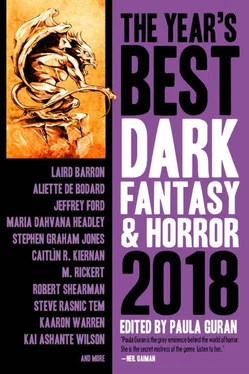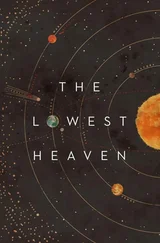“Lady,” a weak voice whispered. “Lady, will you hear me? I am a broken man, and not long for this world. The mistress of the inn sent me after you.”
I turned and saw him for the second time: the man who’d walked out of the bay, still drenched, his waistcoat dripping, his black suit hanging on him as though he was a cadaver. He was correct in his assertion. Blue shadows bruised his eyes, and his cheeks were gaunt. He looked as though he’d climbed from out of a tomb.
“Where have you come from, Sir?” I asked him. The Sir was an afterthought. He was not demon, not ghost, but not whole either.
“A ship,” he said, and I knew him to be deranged, but who was to say that I was not? He was a kindred spirit in that fashion, and so I let him speak. “I swam from a ship that floats there still—on the border of Dream-land—”
He extended a trembling finger toward the horizon, as though I would see his ship. There was nothing to be seen. “—and up again into the light.”
“And what is your name?”
“Edgar,” he said, and swayed, leaning heavily on his cane.
I felt the stowaway twist inside me, and I flinched, bending at the waist. My corset was laced particularly tight, some vain hope of caging the creature and keeping it still. It did not wish to be still.
“Are you well?” he asked.
“I am not,” I said.
“Nor I,” he said, and gave me a look of profound sympathy. “Not since the death of my wife.”
I was reminded of my ghost husband. There were no men made of anything more than trouble in my history, and this one was no different.
“My name is Mrs. MacFarlane,” I said.
“What is your Christian name?” he asked. He was no threat, his body wizened like that of an ancient, though he could not be much older than I.
“Annabel,” I told him. Recognition flickered on his face for a moment.
“Ah, then it is true,” he murmured. “Annabel. I have heard your name in passing, yes, in passing through the night. I have heard it whispered in a dream I had.”
“Are we acquainted?” I asked. He was oddly familiar to me, it was true, more so than just the vision of him staggering up from the sea.
“No, no. We have never met in the waking world,” he said, and the alert look he’d had was gone again. I smelt the alcohol on him, and more than that. He smelled of the sea, of salt, of blood. “I am a dreamer destined only for sorrow, Annabel, and there is one more thing I must do before I end my days.”
Was I entranced by his suffering, so akin to my own? Or his handsome face, his history of loss. Some part of my heart, one I had not noticed in some time, felt enticed to compassion for one so miserable.
“I thought that I was destined for death as well,” I told him recklessly, “but I refuse to accept it. I am to the portraitist. Will you accompany me, sir? I dislike undertaking the journey alone.”
Quite unexpectedly, he smiled.
“You would take me to a photographer?” he asked. “This broken poet? Four days ago, I attempted suicide on a train. When I woke, it was on a ship in this bay, and I knew the crew of tattered men, and I knew the captain. He hunts the night for a beast he cannot find, a thing from his own sleeping kingdom which has fled to this one. He has sent me into the town to seek on his behalf, Annabel, to seek the beast. Have you seen it?”
He stood, his hands hanging, a pleading expression on his face. And here was I, containing the beast he sought. Here was I, an unwilling case for a spirit I’d never invited in.
“I have not,” I told him. I could not trust him yet. I’d met handsome men before. I’d met a handsome ghost, a betrayer of my body. “I do not even know your full name,” I said.
The man before me winced.
“Edgar Poe,” he said. “I am a writer of horrors. It is only reasonable that I should end in horror myself. I have spent my life a dreamer, and now my dreams haunt me in daylight.” He lifted his shoulders and his expression was that of profound regret. “It was a dream I made, long ago, and I worked at it, night after night, inventing its appetites. The dream made itself flesh and escaped the boundary of the land I’d made for it. After that, I know not where it went, though I am told there have been tales of its takings. I did not imagine I would be held here to reckon with my imagination, unable to die unless I captured it.”
I felt faint, but still more resolved. The lacings of my corset bowed behind my back, and I gasped, pulling my own flesh in as the stowaway pressed against it. I felt the bones bend, and the silk threads, in the claws of something horrid.
“A dreamer,” I said, thinking of my own miserable, missing nights. “That does not matter. What one does in the dark is not a thing one must own in the light.”
“If that were the truth of things, then murders might be done at midnight and never a murderer jailed for them,” Poe said.
I thought of fingerbones, of a ribcage, of a man’s wedding ring I’d found in the bosom of my dress. I thought of pocket watches and ink pens, of men I’d never met, of a black silk tie undone and knotted again about my wrist. I thought of a carved ivory cane I’d found beside my bed, the knob carved into the shape of a skull. All these things could have belonged to a man like the man before me, and too, he resembled a man I’d known once, long ago, a man who had been my husband.
I thought of the true reason I’d fled, a sudden waking in the darkest hours, finding myself far from home. I thought of the man I’d found before me, on his back, a man who looked enough like this one to be a twin to him. This one was not dead, no, but moaning on the platform of a train, swearing up and down that he was not waking but dreaming, insisting that he was doomed. It was too early in the morning for a crowd, and I leaned over his face and heard my own hiss, my own voice honeyed and covetous. I felt my body hum at proximity to the man and to his mind, but he was drugged and nearly insensible, and the lights in the station were beginning to be lit. I fled. My body was nothing human at all. I had torn his papers from his case, and rifled through them, hunting I know not what. What did the stowaway want? A maker? A parent? The man who had created it? What did it want with me, but a vessel? I’d been too long a vessel for this monster. I’d been too long hungry for meals I did not wish to consume.
“Take it away from me,” I said to the poet. “Can you do that?”
“Perhaps,” the poet said. “That is my aim.”
I felt the stowaway longing for something, but what I knew not. It did not want me, though it accompanied me. It had never wanted me. It wanted a man, or a friend, or a companion other than I. Where had it come from? The country beyond the wall? The ship anchored in the bay? The place where night slept when the sun was in the sky?
If I could not be rid of my monster, I would go to Thule myself. If it was death I courted, so be it. I glanced up at the angle of the sun. Still enough time in the day for safety. The stowaway slept.
“Accompany me,” I said, and the poet looked at me. The stowaway clasped and unclasped my fingers, stretched itself inside the borders of my body. It had been days since I’d fed on the meal the stowaway wished for, and I knew I had only hours before it would overcome me.
Poe took my arm and I felt him trembling. Together, we walked to Winchester Street, three beings, each breathing and longing, each desirous of its own story.
The Poet’s Annotation
And now the story of the poet and the story of the lady and the story of the stowaway converge into one line, fiction and fact pressed too closely together to tell one from the other. The waking world and the sleeping one are the same, each engineered by dreamers of one kind or another. The poet writes an obituary for himself. The poet writes a tale of grief, his wife lost, his love dead. The poet is in a pit, and above him a pendulum. He will not marry again. He will be denied, and with that denial will come the rest of his life, the last year on earth. He writes on, the monster beside him, and the lady he’s made of all the ladies he’s lost. He writes himself down Winchester street, walking with a companion who may or may not be visible to anyone else in Providence. There will be no record of anyone named MacFarlane, nor of anyone met at a hotel. There will be nothing but this poet walking through the streets and to a portraitist, in the worst week of his life.
Читать дальше












